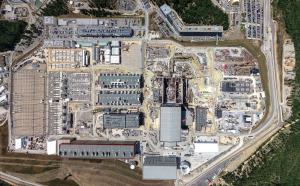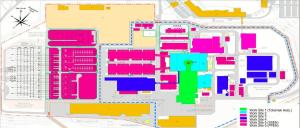A colossal task made manageable
For the execution of work during the next project phase—machine and plant assembly up to First Plasma—the ITER Organization has chosen a contractual approach that emphasizes manageably sized work packages with strong risk management. Nine major assembly and installation contracts are foreseen.
Starting in March 2020 with the first major lift operation—the delivery of the cryostat base to the Tokamak Pit—and ending with the closure of the cryostat lid, the first phase of ITER assembly covers the construction of the core machine and the installation of plant systems needed for First Plasma.
In developing its strategy for the assembly of the ITER machine and plant, the ITER Organization began by looking carefully at other large construction projects and benchmarking best practices. This groundwork led to the development of a number of core principles for the tendering and contract phases:
- Strive for cost and schedule control and flexibility through manageable lots;
- Minimize interference and interfaces between the different contractual scopes;
- Secure timely work execution by foreseeing temporary backup;
- Benefit from industry knowledge and know-how wherever possible;
- Allow industry to propose methods or processes within well-defined boundaries to accelerate or optimize work.
For the purpose of tendering, assembly and installation work on the ITER construction platform has been organized in three zones (see the colour coding in the diagram below)—the Tokamak Complex (except the machine); the Tokamak machine (Tokamak Pit, Assembly Hall and Cleaning Building); and the balance of plant (all plant and auxiliary buildings). Each zone is as physically isolated as possible, with its own access paths and laydown locations in order to minimize interference.
Within these zones, work will be executed under nine major assembly and installation contracts.
"We have chosen to divide the assembly scope into manageable work packages with time phasing and clear responsibility for performance in order to permit better schedule and cost control throughout the lifetime of the contracts," says Katsumi. "This approach will give us the flexibility we need to work with uncertainty—either in the effective handover dates of certain work zones, the availability of tooling, or the risk that some components may be delayed or require adjustment on arrival."
Time phasing means that work will be carried out based on construction work packages that are released by the ITER Organization in achievable—and trackable—batches. In some cases, contractors will be involved in the engineering development of the work packages to provide early input on construction optimization and methodology.
For the most complex and time-sensitive areas—the Tokamak machine and the Tokamak Complex—the choice has been made to preserve peer competition by splitting the works in these areas between at least two contractors. It also protects the ITER Organization in the case of contract default, as one contractor can take over in a relatively short amount of time from the other.
Contracts are awarded through competitive call for tender. First, the ITER Organization invites companies from the ITER Members to express interest through the "Call for Nomination" process. This stage is followed by a pre-selection of candidate tenderers (the "Pre-Qualification Application"), and finally the tender invitation is effectively issued ("Call for Tender"). (See more about the ITER procurement process here.)
The global tendering phase for the assembly and installation contracts is now drawing to a close. All Balance of Plant contracts have been issued; the two Tokamak Assembly (TAC) contracts have been awarded (but not yet signed); and the two Tokamak Complex (TCC) tenders are under evaluation.
The ITER Newsline will have a full report on contract awards in September.



